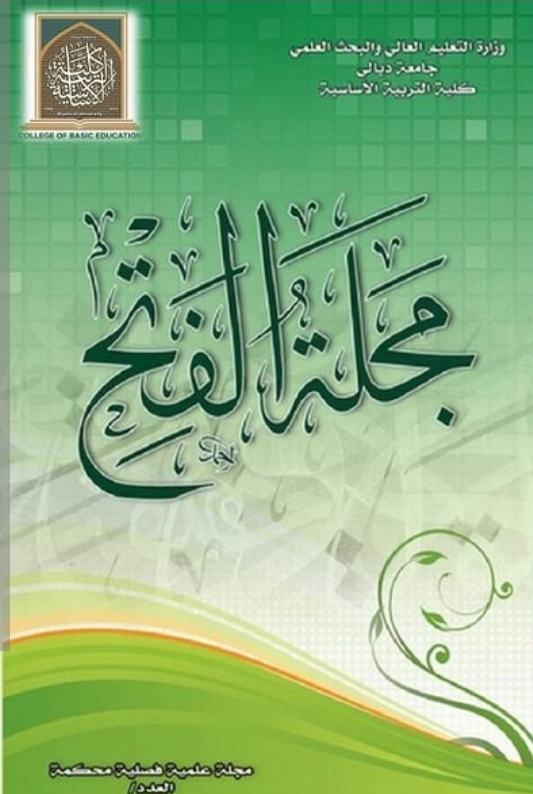The Degree of Using Reflective Practices from the Perspective of Secondary School English Language Female Teachers in Riyadh City
DOI:
https://doi.org/10.23813/FA/23/1/15Keywords:
Reflective Practices, English language female teachers, secondary schoolAbstract
This study aims to identify the degree to which using reflective practices from the perspective of secondary school English language female teachers in Riyadh City. In this study, the descriptive analytical method was used, and the researcher designed a questionnaire which was used as the main research instrument. The study sample consisted of (163) female teachers of English for secondary school working in Riyadh City. The results of this study show that the level of reflective practices as perceived by English language female teachers at secondary school in Riyadh is greater, and that the most important reflective practices are the learning environment which gained the first rank with an average of 2.69 out of 3, followed by evaluation in the second rank with an average of 2.58 out of 3, and planning and preparation, which came in the third rank with an average of 2.51 out of 3. The implementation of teaching ranked fourth with an average of 2.44 out of 3. The study shows that there were no statistically significant differences at the level of (0.05) between the mean scores of the reflective practices of the English secondary school female teachers due to the academic qualification variable. Also, the results reveal that there were no statistically significant differences at (0.05) among secondary school English female teachers due to the variable of work experience.
References
References
Abu Salim, Iman (2016). The effect of reflective practice on the university teacher in improving teaching performance, International Specialized Educational Journal, 2016,2,5,229-322.
Abu Sultan, Abdul Nabi and Abu Assaker, Muhammad (2017). Estimating the degree of reflective practices among science teachers in the upper primary stage in North Gaza, Palestine University Research Journal, 7 (1), 212-243.
Al-Ayasra, Walid (2015). Teaching thinking and its skills. Amman, Dar Osama.
Al-Kaltham, Hamad bin Mardi (2014). The effectiveness of reflective teaching in the development of some necessary competencies in the recitation and memorization of the Holy Quran among students’ teachers of Islamic education at Umm al-Qura University.
Arnold.1,(2005) Discovering Reflective Practice. http://firstclass.ultaversity.net.tindal/rm/modeloview.html.
Boukahos, Khalid (2017). The relationship of reflective thinking to the teaching performance of student’s teachers of science and mathematics, International Journal of Educational Research, United Arab Emirates University 1, (41), 39-65.
Capobianco, M. (2007); A self-study of the role of Technology in Promoting Reflection and Inquiry-Based Science, Journal of science Teacher Education, 18 (2) Apr.
Dahmash, Abed Luli Bin Hussein (2018). Professional development of teachers and reflective practices, Research Trends, Center of Research Excellence in the Development of Science and Mathematics Education.
Ellison. C. (2008). Reflective Make-and-take; A Talent Quest Reflective Practice Teacher Model, Reflective Practice,9(2),185-195.
Farrell, T. (2008) Reflective Practice in the Professional Development of Teachers of Adult English Language Learners. Center of Applied Linguistic Network.www.cal.org/caelanetwork.
Ferwana, Mamdouh (2006). The level of reflective teaching among student teachers of English at Gaza universities, unpublished master's thesis. Islamic University. Gaza.
Hassan, S. J. (2013). A program based on reflective teaching to develop teaching skills according to quality standards and to modify the orientation of the teaching theory of the pre-service female teachers of Arabic language and Islamic studies in Egypt and Saudi Arabia, International Journal of Specialized Education, 2(7).
Knowles, B, Reflection Practices; Curriculum Development Through Research Informed Teaching in sports Science. http//www.Ijmu.ac.uk/lid/lid-docs/2008.
Minott, M (2007) The Extent to which seasoned in the Cayman island use Elements of Reflective Teaching in Their lesson Panning, Implementation. And Evaluation; Implication for Teacher Education and Training Globally and Locally; ERIC Digest, ED 495112.
Miontt, M. (2007). The Extent to Which Seasoned in the Cayman Island Use Elements of Reflective Teaching in Their Lesson Panning, Implementation, and Evaluation; Implication for Teacher Education and Training Globally and Locally,” ERIC Digest,ED495112,2007.
Mohamed, Buthaina Mahmoud, (2017). Effectiveness of a training program based on structural theory in the development of some reflective teaching skills of the female student teachers of the Arabic language studying in the general educational diploma program at the University of Shakra, Journal of Educational Sciences, Umm Al-Quri University.
Obaidat, Lima (2017). The reality of the use of reflective practices and their impact on the achievement of motivation of the teachers of the upper elementary stage in Irbid governorate. An-Najah University Journal of Humanities, 31(12), 2275-2300.
Rayyan, Attia (2014). The reality of reflective teaching among teachers of mathematics in basic education stage, a research presented to the Conference on Improving the Quality of Education in Arabic, English, Science and Mathematics, held at the Arab American University on 17 March.
Scott, S. and Iss, (2007) Closing the Loop: The Relationship Between Instructor Reflective Practices and Student Satisfaction and Quality Outcomes.
Shaheen, Mohamed (2012). The reality of the reflective practices of faculty members at Al-Quds Open University and their relation to their attitudes towards professional development in the light of some variables. Journal of Al-Azhar University in Gaza, Human Sciences Series, 14 (2), 181-208.
Shaheen, Mohamed Abdelfattah (2012). Professional development of faculty members as an approach to achieving quality in Higher Education, a study presented to the Conference on Quality in Palestinian Higher Education, organized by Al Quds Open University, 3-5 July, Ramallah.
Downloads
Published
How to Cite
Issue
Section
License
Copyright (c) 2023 https://creativecommons.org/licenses/by/4.0/

This work is licensed under a Creative Commons Attribution 4.0 International License.
حقوق النشر والترخيص
تطبق مجلة الفتح للبحوث التربوية والنفسية ترخيص CC BY (ترخيص Creative Commons Attribution 4.0 International). يسمح هذا الترخيص للمؤلفين بالاحتفاظ بملكية حقوق الطبع والنشر لأوراقهم. لكن هذا الترخيص يسمح لأي مستخدم بتنزيل المقالة وطباعتها واستخراجها وإعادة استخدامها وأرشفتها وتوزيعها ، طالما تم منح الائتمان المناسب للمؤلفين ومصدر العمل. يضمن الترخيص أن المقالة ستكون متاحة على نطاق واسع بقدر الإمكان وأن المقالة يمكن تضمينها في أي أرشيف علمي.
لمزيد من المعلومات، يرجى متابعة الرابط: https://creativecommons.org/licenses/by/4.0/.



